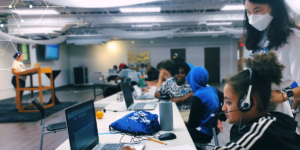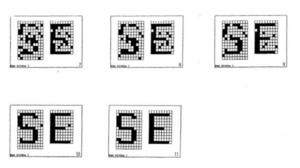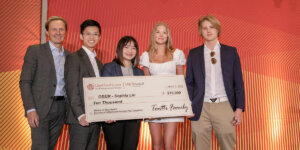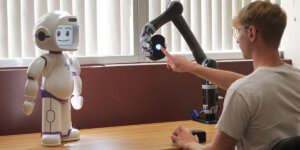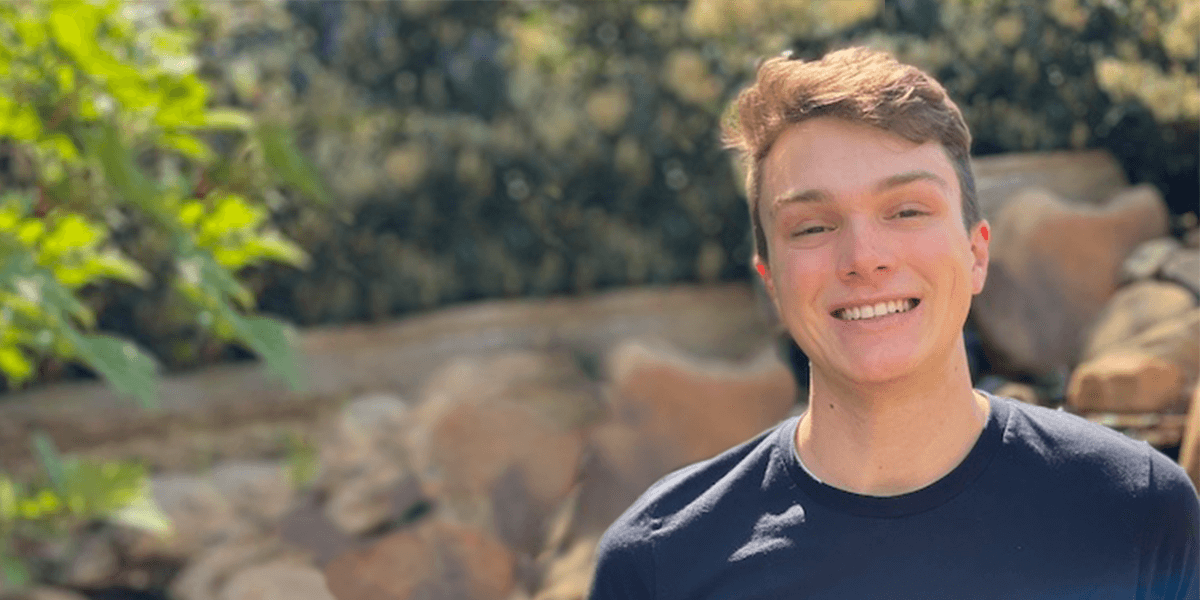
Shift SC cofounder Adam Novak (Photo/Courtesy of Adam Novack)
The 4 a.m. gong roused USC Viterbi student Adam Novak from a deep sleep. After quickly dressing in drab, loose fitting, gray cotton pants, a black T-shirt and sandals, he made his way to breakfast, eating some oatmeal and fruit – one of only two meals he would eat that day.
Walking down a long corridor, Novak made his way to the meditation room. He kicked off his shoes, sat down on a thin mat, crossed his legs, put his hands on his lap, and “turned inward, toward my breath and body, in the present moment.” Novak spent 10 hours that day in quiet thought.
The place: a Buddhist monastery in Tiaong, Philippines. The time: January 2020. The purpose: to live as a monk on a 10-day silent meditation retreat to achieve deeper self-understanding and move closer toward contentment, clarity and inner peace.
As Novak slipped deeper into himself at the monastery, his mind turned to technology and his longstanding ambivalence toward it. During his first year at USC, the computer science and East Asian languages and cultures double major concluded that he and his classmates focused far too much on creating technology’s next big thing, but not enough considering its potential downsides, such as political divisions fueled by social media algorithms.
Now, at the monastery, Novak’s recurring goal of reducing his time on social media was fully realized in an environment where no personal devices were allowed. Ten days without smartphones and filled with meditation left him feeling less anxious and better overall, challenging his perspectives on tech. “How do our devices and apps not just add to our quality of life, but also take away from it?” he contemplated.
Over the course of his meditation retreat, Novak promised himself that he would one day create an organization at USC that would explore technology in all its dimensions and challenge students to think deeper about its effects on society. The thought, which had come first to him during his freshman year, now solidified in his mind.
“I felt this responsibility to help start this type of movement, to create this space for others,” Novak said.
Shift SC
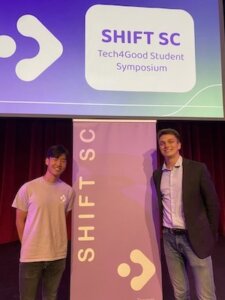
John Heo and Adam Novak of Shift SC (Photo/Courtesy of Adam Novak)
In fall 2021, Novak and USC Viterbi computer engineering student, John Heo, cofounded Shift SC, which bills itself as “USC’s student-led platform for human-centered and socially responsible technology.” Its goal: “to promote interdisciplinary conversation and action at USC around the social implications and ethical issues of tech.”
In its first year, Shift SC held weekly meetings and “digital well-being workshops” addressing topics such as our relationship with social media and our personal devices; established a fund for student researchers to examine the social impacts of technology; and hosted a major Tech4Good symposium that attracted 150 students.
At that April 2022 gathering, USC’s first-ever, student-led annual conference for tech and social good, several USC design teams and students presented their human-centered technology inventions, such as Heard, a USC-based web platform for connecting elected officials with their constituents. David Jay, the chief mobilization officer (CMO) at the Center for Humane Technology, delivered a keynote address about the importance of young leaders taking action towards ethical tech; and Novak, Shift SC’s president, shared his thoughts with the assembled.
“Technology has improved our lives in so many ways, but should we consider it holistically?” he asked. “When might some innovation, while making one thing better, make another thing worse? How do we ensure a future that’s truly aligned with our best interest?”
Novak believes that Shift SC represents a meaningful step toward grappling with such important questions. “In our increasingly technological world, we have a growing responsibility to steer innovation in the right direction and limit its unintended consequences on society,” he said.
Elisa Warford agrees.
A USC Viterbi associate professor of technical communication practice who teaches courses on engineering ethics, Warford said Shift SC’s mission complements that of the recently launched Engineering in Society Program, an expansion of the Engineering Writing Program. Both Shift SC and the Engineering in Society Program, she said, cultivate character and self-reflection.
“Shift SC is a great opportunity to advance these conversations about tech ethics at Viterbi,” said Warford, who serves as the club’s faculty adviser. “We want Viterbi students to think critically about the designs they will be working on as professional engineers, including unintended consequences.”
Warford credits Shift SC’s success to the vision, commitment and tenacity of Novak and Heo, both of whom she had as students. She also said that Novak’s “commitment to doing good in the world” has played an integral role.
A difference maker
At Ravenwood High School in Brentwood, Tennessee, Novak’s dedication to making positive contributions, whenever and wherever possible, began to manifest, along with his interest in service, meditation and technology.
As student body president his senior year, Novak revived the moribund homecoming dance to bring students closer together. As head of the student council a couple years earlier, he oversaw the creation of a formal for freshmen and sophomores, so that they “no longer felt excluded during the prom,” he said.
When a dying school garden became an eyesore, Novak and some high school friends acted. On their own, they raised $500 and rebuilt it with absorbent flora and fauna that not only beautified the area but prevented flooding.
“I just like helping people,” said Novak, a mantra repeated often.
Also in high school, he developed an interest in meditation. His AP psychology teacher would lead 15-minute guided meditation sessions after class that Novak religiously attended. “I remember feeling noticeably calmer afterwards,” he said.
Strong in every subject, Novak especially excelled in math and science. He looked forward to studying computer science in college, which, Novak said, “would be another tool in my toolkit for making the world a better place.”
College crisis and reinvention
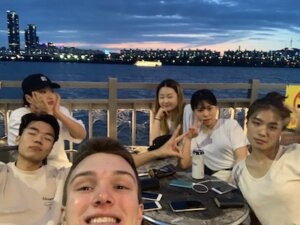
Adam Novak and friends enjoying dinner next to Han River in Seoul, South Korea in 2019 (Photo/Courtesy of Adam Novak)
Novak started USC in fall 2018. Although he loved the campus, his classmates, and studying computer science, he felt a bit unworldly and lost. Several students told him about taking a gap year before starting college and how their international travels had transformed them, including trips to Brazil to volunteer in an orphanage and a sojourn in New Zealand to work for a nonprofit. Novak had never left the country.
At the same time, he began to ruminate about technology and the need to consider all its impacts. By contrast, he said, his peers dreamed of becoming the next Elon Musk. After studying Korean during his second semester, Novak said he decided to take a year off and embark on a “journey into the unknown.”
His first stop was South Korea, where Novak spent three months working on a farm and intensely studying the language. Coming home for a few months to intern for a sustainability consulting firm and save money, he returned to Asia in early 2020, first to the Philippines to silently mediate and then to Malaysia and Japan to teach English. The worsening COVID outbreak forced him to return home to Tennessee in April 2020.
Novak said his time away changed everything.
“I would say that my biggest takeaways were how beautiful it is to live in a new culture, learn a new language and see the world from other people’s eyes,” he said. “I also realized how much potential I have to make a positive impact in the world with this incredible USC education and as someone from the U.S. with so much privilege. All in all, the experience made me even more motivated to take advantage of the great opportunities and resources around me to really help others.”
Korea bound
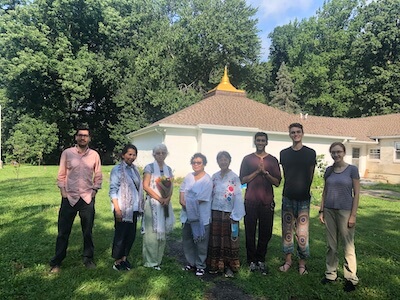
Adam Novak at a meditation retreat in Delaware in 2021 (Photo/Courtesy of Adam Novak)
Now a rising senior, Novak said he expects Shift SC to continue to grow and tackle new challenges. In the next academic year, for instance, he said the USC club plans to partner with local grade schools to offer digital well-being workshops to younger students and to post to its website a newly developed curriculum about the ethics and social responsibility of artificial intelligence.
“We’re incredibly proud of what Shift SC has become, and we expect it will keep growing as we continue to launch innovative initiatives on campus and around LA,” said Heo, the Shift SC cofounder.
“There wouldn’t be Shift SC without Adam because he is the human manifestation of the club,” he added.
Looking forward, Novak said he plans to move to Korea after graduation. He wants to master the language, earn a master’s degree in tech policy, and to again live in a monastery, something he did in the summer of 2021 at Dhamma Pubbananda in Claymont, Delaware.
Whatever path he ends up pursuing, perhaps as a think tank analyst or the head of a digital well-being movement in Asia, Novak said he wants to leave an indelible impression.
“I would like to be remembered as somebody who spent their life working to improve the lives of others,” he said.
Published on June 17th, 2022
Last updated on May 16th, 2024




